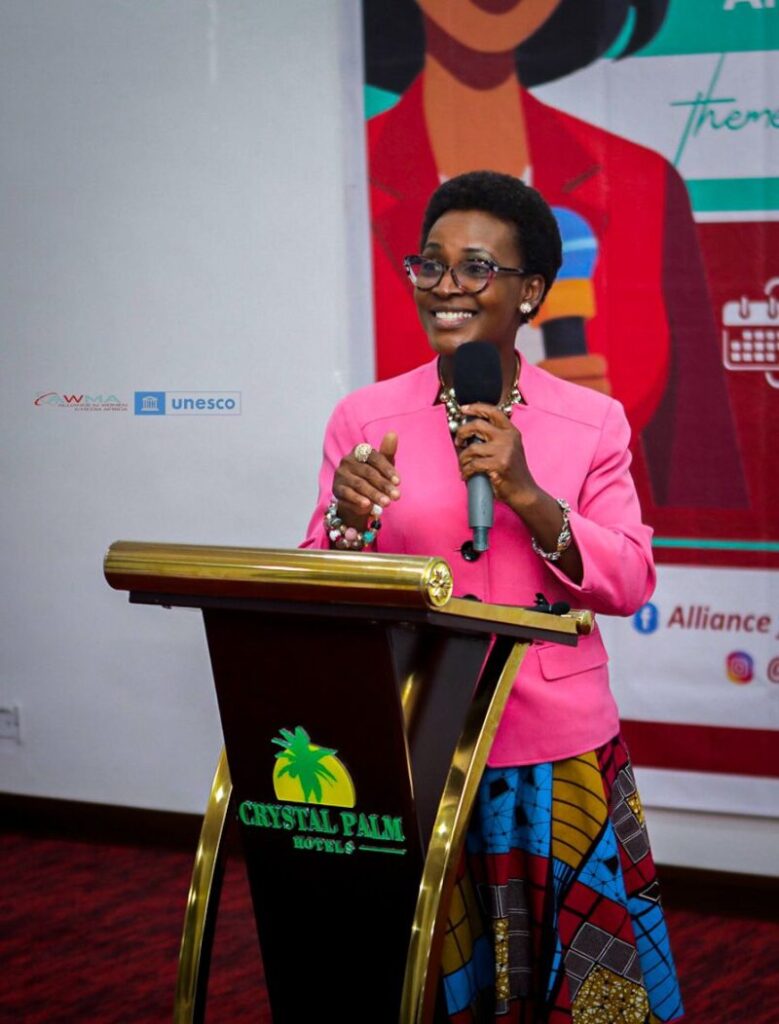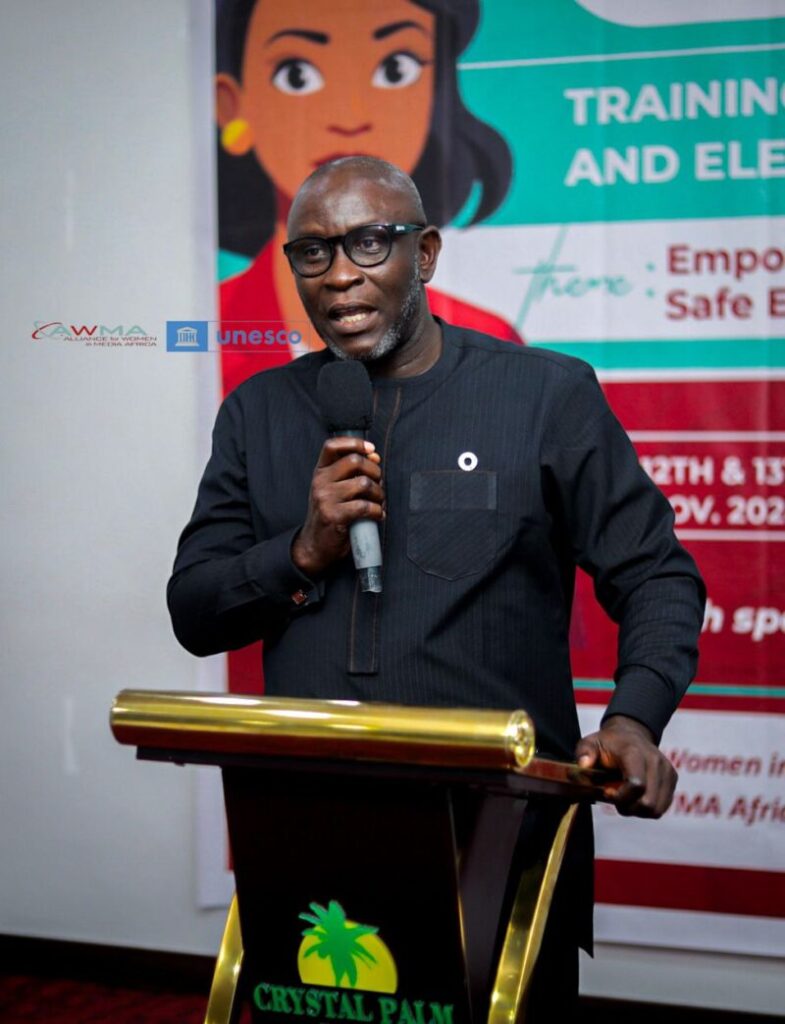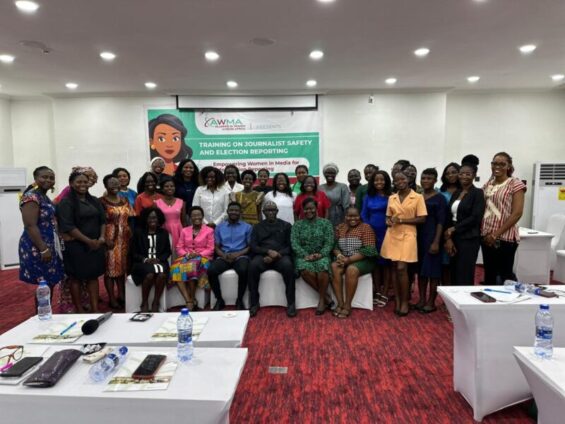Alliance for Women in Media Africa (AWMA), in collaboration with UNESCO, has launched a two-day training programme designed to equip women journalists with critical tools for safe and effective election reporting.
Convened under the theme; “Empowering Women in Media for Safe Election Reporting,” the event marks a significant step in fostering a supportive, secure, and inclusive media landscape in Ghana.
The event, held at the University of Ghana, attracted a diverse and distinguished assembly of dignitaries, media professionals, and aspiring women journalists.

Among the notable attendees were the UNESCO Head of Office, Edmond Moukala, representatives from UNDP and UN Women, the Vice President of the Ghana Journalists Association, and Professor Audrey Gadzekpo, Dean of the School of Communication Studies. Each came together with a shared vision of strengthening democracy through the protection and promotion of women’s voices in the media.
A Call to Action: Inspiring Opening Remarks
Setting the tone for the training, AWMA Convenor, Mercy Catherine Adjabeng, addressed the gathering, underscoring the profound impact of women journalists on democracy.
“As we strive for a media that is inclusive, representative, and courageous, we cannot ignore the vital role women play in holding leaders accountable and promoting peaceful elections,” Ms Adjabeng remarked.
“This training reflects our unwavering commitment to support and empower you, the vanguards of truth and peace, who champion our stories and shine a light on issues that matter.”
Ms Adjabeng urged participants to actively engage in every session, share their experiences, and harness the collective power of this community.

“Over the next two days, immerse yourselves fully, enrich these discussions with your insights, and let us build a network that will drive change, empower women in media, and contribute to a peaceful electoral process.”
A Holistic Approach to Safe and Impactful Reporting: Topics and Sessions
The training programme spanned an extensive array of topics, each essential for mastering safe, ethical, and impactful election coverage. Noteworthy sessions include:
Renowned legal expert Sampson Lardy Anyeneni guided participants through crucial safety practices, emphasising the need for meticulous preparation to safeguard personal and professional security when covering high-stakes electoral events.
Veteran journalist Rosalind Amoh provided an insightful breakdown of the election cycle, emphasising the media’s duty to track, analyze, and responsibly report on each phase, from campaigning to results. Her session underscored the pivotal influence journalists hold in shaping public perception during elections.
Digital media strategist, Maud Ashong explored the transformative potential of new technologies, equipping journalists with modern investigative techniques to enhance the accuracy and depth of their reporting.
Participants were also trained on fact-checking, conflict-sensitive reporting, and self-care for journalists—vital skills for maintaining resilience, ethical integrity, and psychological well-being in a demanding field.
Advancing Gender Sensitivity and Media Safety
A keynote presentation by UNESCO’s National Professional Officer for Communication and Information, Abdul Hamid Yakub, reinforced the imperative of gender-sensitive media policies.
“Journalists must be informed of their surroundings and equipped to report accurately. News organisations must establish formal procedures to protect against online harassment, particularly for women,” Mr Yakub emphasised.

He advocated for the Ghana Journalists Association (GJA) and AWMA to develop a framework for systematically tracking harassment incidents, recommending that these findings be published regularly or integrated into a national safety monitoring mechanism for media professionals.
This strategic approach, Mr Yakub explained, would create an added layer of accountability, strengthening safeguards for women journalists and fostering a climate where media professionals can operate freely and without fear.
Celebrating Women’s Representation in the Media
Adding to the day’s momentum, Professor Audrey Gadzekpo, Dean of the School of Communication Studies at the University of Ghana, highlighted the transformative potential of the initiative.
“This programme is an important stride toward ensuring not only the safety of women journalists during elections but also the amplification of women’s representation. Women’s voices matter deeply, and through your reporting, we bring balance, perspective, and visibility to our nation’s story.”

Prof Gadzekpo encouraged journalists to embrace the responsibility and privilege of elevating diverse voices in their work.
“As women in media, you are more than observers; you are shapers of our collective narrative. Together, we can shift perspectives and promote a fairer, more representative Ghanaian society.”
Building a Lasting Legacy of Empowerment and Inclusivity
The UNESCO-sponsored initiative is not merely a training event but a cornerstone in AWMA’s mission to uplift women in media.
Special thanks were extended to UNESCO and the AWMA Steering Committee, who, as Ms. Adjabeng noted, worked tirelessly to ensure the program’s success.
The alliance hopes that participants will not only gain practical skills but also leave with a network of allies, mentors, and advocates committed to their safety and professional growth.
Through their collective efforts, AWMA and UNESCO have sown the seeds of change, cultivating a media landscape where women journalists can report with confidence, drive social change, and protect the democratic values they hold dear.
As the programme continues, attendees are set to emerge empowered, inspired, and ready to shape the narrative of Ghana’s elections, ultimately contributing to a safer, more inclusive media environment in the country.
Latest Stories
-
Celebrating Melvina Amoafo: A Legacy of excellence in Ghana’s capital market
57 minutes -
Restoring Meritocracy: A path to effective governance in Ghana
57 minutes -
Relief as Agavedzi Sea Defence Project officially begins
1 hour -
Engr. Kwame Adu-Mante celebrates professional milestone with IET Ghana
2 hours -
Elizabeth Amoaa’s quest to empower women, transform lives and raise voices
5 hours -
Gauff beats Sabalenka to win French Open title
5 hours -
Deputy Finance Minister urges diasporans to continue sending remittances despite cedi appreciation
5 hours -
Asante Mamponghene’s burial rites attract thousands of mourners
6 hours -
“The job was waiting for me”: MTN Ghana CFO shares career journey
6 hours -
Frema Foundation Launches ‘Dignity in Bloom’ initiative to tackle period poverty in Ashanti Region
7 hours -
Mayor of Accra calls for renewed commitment to climate action as city commemorates June 3 disaster
7 hours -
Special Prosecutor should lead call for asset publication – Dafeamekpor
7 hours -
Empower360 completes third training session for 30 young women under Ghana Grows Program
8 hours -
Sudan: A new gov’t amid escalating military-political conflicts and a deepening humanitarian crisis
8 hours -
National Vaccine Institute makes impressive strides, activate measures for drug production
8 hours

